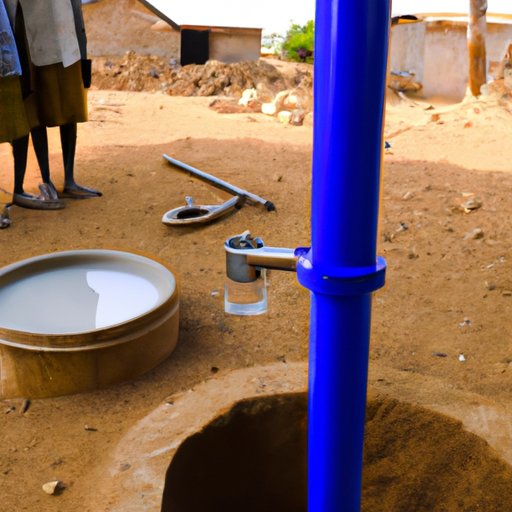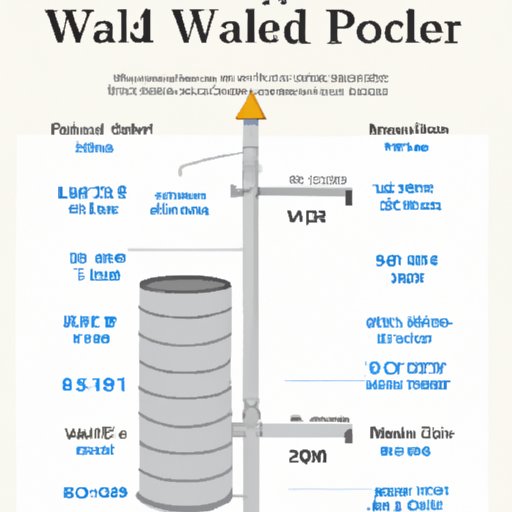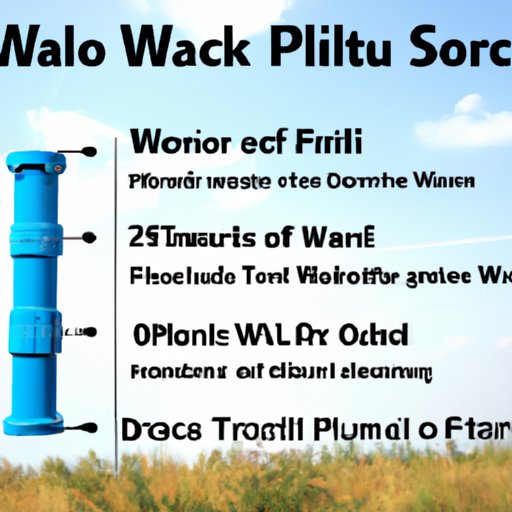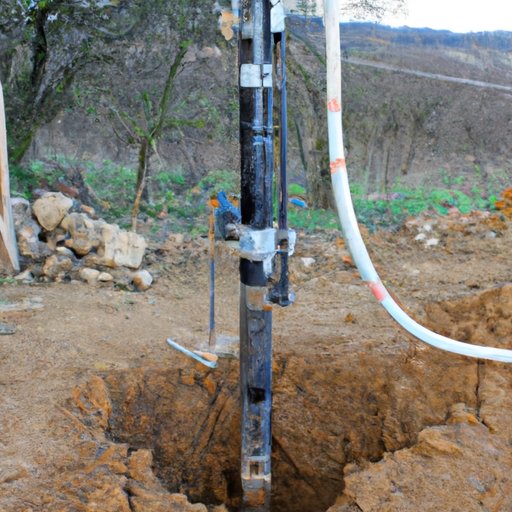Introduction
Water wells are becoming increasingly popular due to the convenience and cost savings they offer compared to other sources of water. However, the cost of installing a water well can vary greatly depending on the size and type of well, the location, and other factors. It’s important to understand the true cost of owning a water well before making a decision.
Cost Analysis of Water Wells: Breaking Down the Price of a Home Well
Before diving into the specifics of how much a water well costs, it’s important to understand the different components that go into the installation of a water well. The process generally involves digging or drilling a hole in the ground, installing the casing and pump, and connecting the piping to the house. Let’s take a look at each component and examine what factors influence the cost of a water well.
Overview of the Different Components of a Water Well
The most basic component of a water well is the well itself, which is usually dug or drilled into the ground. This is followed by the casing, which is a pipe that runs down the center of the well and helps to keep the sides of the well from collapsing. A pump is then installed at the bottom of the well to draw water up to the surface. Finally, plumbing is connected from the pump to the house, allowing the water to be used inside.
Factors Affecting the Cost of Installing a Water Well
The cost of a water well will depend on several factors including the size and type of well being installed, the location, and the materials and labor needed. The size of the well is determined by the amount of water needed and the depth at which water can be reached. The type of well will also affect the cost; for example, a shallow well requires less drilling than a deep well, and a driven well requires less digging than a bored well. Location is also an important factor in determining the cost of a water well, as certain areas may have higher labor costs or more expensive materials.
Average Costs of Materials and Labor Required to Install a Water Well
The average cost of materials and labor required to install a water well can range from $1,500 to $15,000 depending on the size and type of well, the location, and other factors. Generally, shallow wells are less expensive than deep wells, while driven wells are less expensive than bored wells. Labor costs will depend on the local market, but can range from $750 to $3000 depending on the complexity of the job. Additionally, the cost of materials such as the casing, pump, and plumbing can range from $300 to $10,000 depending on the type and quality of materials used.

The True Cost of Installing a Water Well: What You Need to Know
When considering the cost of installing a water well, it’s important to remember that there are other costs to consider beyond just the materials and labor. Regulations and permits may need to be obtained in some areas, and the cost of these can vary significantly depending on the location. Additionally, the cost of maintenance should be taken into account, as water wells require periodic maintenance to ensure they are operating correctly.
Potential Extra Costs to Consider: Regulations, Maintenance, etc.
In some areas, regulations and permits must be obtained before a water well can be installed. These costs can vary significantly depending on the location, so it’s important to research local laws and regulations before beginning the installation process. Additionally, water wells require periodic maintenance to ensure they are functioning properly. This can include checking the pump, cleaning the well, and testing the water for contaminants. The cost of maintenance will depend on the frequency of service and the complexity of the job.
Money Saving Tips for Installing a Water Well
There are a few ways to save money when installing a water well. First, it’s important to do your research and compare prices from different contractors. Additionally, you can save money by purchasing materials yourself instead of relying on the contractor to provide them. Finally, you can save money by opting for a less expensive type of well, such as a shallow well or a driven well.

A Guide to the Average Cost of a Water Well
Now that we’ve examined the different components of a water well and the factors that affect the cost of installation, let’s take a look at the average cost of a water well across different regions and countries. The cost of a water well can vary significantly depending on the location, so it’s important to research local prices before making a decision.
Comparing Costs Across Different Regions and Countries
The cost of installing a water well can vary significantly depending on the region or country. In the United States, the average cost of a water well ranges from $1,500 to $15,000, depending on the size and type of well and the location. In Europe, the average cost of a water well is typically higher, ranging from €2,000 to €20,000 depending on the same factors. In Australia, the cost of a water well can range from AU$2,500 to AU$25,000.
Examining Different Types of Water Wells and Their Costs
The type of water well you choose will also affect the cost of installation. Shallow wells are typically less expensive than deep wells, while driven wells are less expensive than bored wells. Additionally, if you have access to a natural spring on your property, you may be able to install a spring box well, which is a relatively inexpensive option.
How Much Money Does It Take to Dig a Water Well?
Digging a water well is a complex process that requires specialized equipment and expertise. The cost of digging a water well depends on the size and depth of the well, the type of soil, and other factors. Generally, the cost of digging a water well can range from $1,000 to $5,000 depending on the size and complexity of the job. It’s important to note that this cost does not include the cost of materials or labor.
Understanding the Process of Digging a Water Well
Digging a water well involves using a series of tools to create a hole in the ground and reach the water table. The process begins with a drill rig, which is used to create a hole in the ground. The hole is then lined with casing to prevent collapse, and a pump is installed at the bottom of the well. Once the well is complete, it is tested to ensure it is safe for use.
Calculating the Cost of Drilling a Water Well
The cost of drilling a water well will depend on the size and depth of the well, the type of soil, the location, and other factors. Generally, the cost of drilling a water well can range from $1,000 to $5,000 depending on the size and complexity of the job. Additionally, the cost of materials and labor should be factored into the total cost of the project.

An Overview of the Costs Involved in Installing a Water Well
Installing a water well is a significant investment, but it can provide many benefits in the long run. It’s important to take all of the potential costs into consideration before making a decision. The cost of materials and labor will vary depending on the size and type of well, the location, and other factors. Additionally, there may be other costs such as regulations and maintenance that should be taken into account. Lastly, it’s important to explore different financing options to ensure you get the best deal.
Upfront Costs vs. Long-Term Benefits of Owning a Water Well
The upfront cost of installing a water well can be substantial, but the long-term benefits often outweigh the initial expense. Owning a water well can provide a reliable source of water, which can reduce monthly water bills and provide peace of mind. Additionally, a water well can increase the value of your property and provide a sense of independence.
Exploring Different Financing Options for Installing a Water Well
If the cost of installing a water well is too high, it’s important to explore different financing options. Many banks and lenders offer loans for water well installation, which can help spread out the cost over time. Additionally, some local governments offer grants and other financial assistance for those looking to install a water well.
Conclusion
The cost of installing a water well can vary greatly depending on the size and type of well, the location, and other factors. It’s important to do your research and understand the true cost of owning a water well before making a decision. Additionally, there may be additional costs such as regulations and maintenance that should be taken into account. Finally, it’s important to explore different financing options to ensure you get the best deal.
(Note: Is this article not meeting your expectations? Do you have knowledge or insights to share? Unlock new opportunities and expand your reach by joining our authors team. Click Registration to join us and share your expertise with our readers.)
